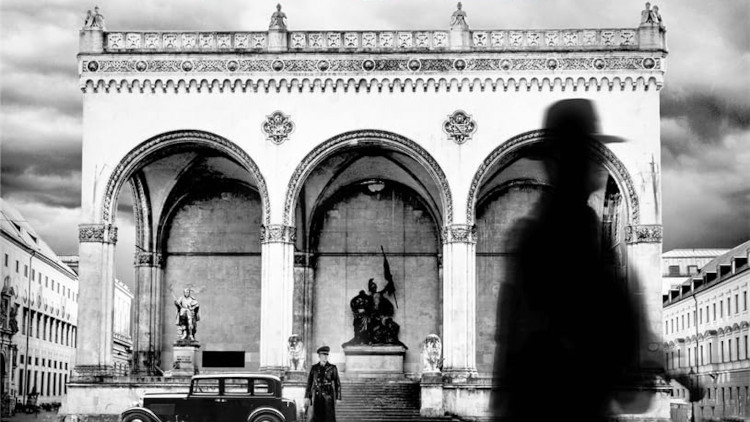
Alan Bardos reviews Munich Wolf, the first in a new series of Second World War spy novels by Rory Clements. He finds it “engaging and well researched“.
Hot on the heels of Rory Clements’s fantastic Tom Wilde espionage novels, comes his new series featuring Detective Sebastian Wolff. Staying in the pre-war era of the first Wilde books, Clements moves to 1935 Munich and the early days of the Nazi regime.
Wolff, a veteran of the First World War, is a detective in Munich’s criminal police (or Kripo) and is vehemently anti-Nazi. He struggles to adapt to the ‘new normal’ of the regime, getting into serious trouble for something as seemingly innocuous as not giving a Nazi salute. When the body of a young English socialite, the Honourable Miss Rosie Palmer, is found mutilated and covered in strange symbols, Wolff is called in to solve her murder.
Rosie Palmer is the daughter of a well connected family; her mother is a lady-in-waiting to Queen Mary, which adds a further layer of complexity to an already difficult case. Germany is in the middle of negotiating a naval treaty with Great Britain, which could be jeopardised by the fallout from the murder.
The victim is part of the smart set of Bright Young Things who flocked to Munich at the time to swim in the picturesque lakes, learn German and drink beer, making it one of the most fashionable cities in Europe.
Wolff’s investigation brings him into contact with this rather interesting cast of characters. The most notable being the real-life Unity Mitford, a notorious Nazi and a close friend of Adolf Hitler — who is consequently known by her jealous contemporaries as the girl with ‘fingers like Munich white sausage.’
Mitford takes a personal interest in the case and steers the investigation down a blind alley, casting blame on Rosie Palmer’s lover Karl Friedlander, a Jew.
Wolff’s superiors are all to eager to clear the case up quickly and place the blame on this outcast. Wolff is not easily put off and when more bodies turn up it becomes obvious that they are hunting a serial killer. Wolff feels hemmed in and watched by the Nazi regime at work and at home.
When he discovers that there is a connection between the murders and the Norse mythology beloved of senior Nazis he has to tread a thin line to solve the case without getting into further trouble with the regime and endangering his family.
There are a couple of rather large coincidences that drives the plot forward and brings the murders closer to home for Wolff, which can be distracting. On the whole, though, this is a very engaging and well researched mystery that brings together a fascinating array of well-drawn characters.
For me the standouts are the sullen and petulant Unity Mitford, who never fails to live up to the legacy of the real-life person, and Hitler’s (actual) chum, the flamboyant and urbane foreign press chief Ernst ‘Putzi’ Hanfstaengl, who carefully tries to control Wolff through a mix of charm and veiled threats, never leaving any doubt that he’s a leading light in an authoritarian regime.
Wolff’s minder from the political police, Sergeant Hans Winter, is also a compelling character who undergoes a well-observed transition as he changes from villain to hero, coming to terms with who he is.
The honest and determined Wolff is a great character and a welcome addition to the canon of novels about the Kripo in Nazi Germany. A genre that continues to be a rich seam of inspiration with some great books by Philip Kerr, Robert Harris, Luke McCallin, Volker Kutscher, David Thomas and Simon Scarrow.
Clements’s book stands up well amongst such august company and continues to ask the essential question: how can a good man serve an oppressive and murderous regime, and bring justice in a corrupted system?
Munich Wolf by Rory Clements is published in paperback on 23 May, 2024.
Read more about this book.
Rory is a former national newspaper journalist who became a historical thriller writer in 2007.
His bestselling John Shakespeare series, set in the Elizabethan era, was followed by the Tom Wilde Second World War spy novels.
In 2010 Revenger won the CWA Ellis Peters Historical Fiction Award, which Rory won again in 2018 with Nucleus. He lives in Norfolk.
Read an extract from Nucleus.
Alan Bardos has also recently published the first of a new series of spy novels set during World War Two. Rising Tide came out in December last year.
Before that, his Johnny Swift novels explored the events of the First World War.
Alan has written a Historia feature exposing the surprising link between Britain’s attack on Taranto in 1940 and the Japanese strike on Pearl Harbor in 1941, the inspiration for his first Daniel Nichols thriller. He lives in Oxfordshire.
Find him at:
Twitter/X
Facebook
Instagram
Goodreads
You may enjoy these related Historia features:
John F Kennedy, the ambassador’s second son by Susan Ronald
The Minister for Illusion: Goebbels and the German film industry by Catherine Hokin
Sent away by sea: the forgotten history of WWII’s ‘seaevacuees’ by Hazel Gaynor
Don’t mention the war! by Keith Lowe
Images:








